2004 Dalhousie Sport Hall of Fame Class
In 2004, Dalhousie inducted six athletes, two builders and two teams as part of it's inaugural Hall of Fame class.
Peter Corkum, Jean Gardner-Grant, Scott Henderson, Karin Maessen, Susan Mason MacLeod, and Ted Wickwire were all inducted as athletes. Nigel Kemp and Lois MacGregor were inducted as builders and the 1976 Women's Field Hockey and 1954 Men's Football teams were also inducted.
Peter Corkum, Athlete: Football & Hockey
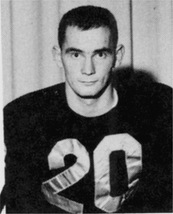 A lot can be said for athletes that exemplify determination, integrity and sportsmanship. When these characteristics are associated with an athlete throughout a 50-year career (and counting), Peter Corkum’s athletic prestige goes without saying.
A lot can be said for athletes that exemplify determination, integrity and sportsmanship. When these characteristics are associated with an athlete throughout a 50-year career (and counting), Peter Corkum’s athletic prestige goes without saying.
As a student athlete at Dalhousie, Peter was on the varsity rosters for both football and hockey. It was an exciting time for football at Dalhousie in the late 1950s and early 1960s. Peter‘s contribution to the legend started with the Nova Scotia Football League’s Rookie of the Year honours in 1957 and continued through five years of football that ended in 1961 with a Dalhousie record and a declaration. At that time he was the highest scoring player in Dalhousie’s football history and the University recognized Peter and the late Ted Wickwire by declaring November 11, 1961 “Corkum and Wickwire Day.”
Peter tested every position on the football field before settling in at running back. His player statistics report gaining 2,199 yards in 357 carries for an average of 6.2 yards per carry. He caught 27 passes for 316 yards. His 172-point scoring career was the best Dalhousie had ever seen. But Peter’s contribution to the football Tigers ran deeper than the numbers. For the 1961-62 season, Peter was awarded Dalhousie’s Climo Trophy and the Neil MacKinnon Trophy. The former was awarded to the male athlete of the year who most represented athletic ability, sportsmanship and team spirit, the latter for most outstanding in integrity and sportsmanship. Peter also earned Dalhousie’s Little Award for most outstanding football player for the 1959 season.
In 1958-59 and 1960-61, Peter was presented the Silver “D” and Gold “D” in respective years. The Gold “D” was a prestigious athletic award presented for three years of outstanding individual varsity performance. Similarly the Silver “D” was presented following two years of the aforementioned contributions. Peter graduated from Dalhousie University in 1961 with a Diploma in Engineering.
Outside of his varsity commitments, Peter found time to excel in golf and curling. He earned a 3-handicap during many years of play at the old Ashburn Golf Club. A most noteworthy year was 1964 when Peter recorded a score of 64 on the par 67 Ashburn course followed by 5 consecutive par rounds.
In 1965, Peter’s curling foursome earned the right to represent Nova Scotia at the Canadian championships. They repeated the feat in 1967 and 1970. He also represented Nova Scotia at the Canadian senior men’s championships in 1992, 1993, 1997 and 2003. Although still an avid player, Peter’s highest curling honours came as a coach. In his fifteenth year as a high-level curling coach, Peter coached the Dacey rink to a world curling bronze medal this past season. As the previous coach of Colleen Jones’ championship rink, Peter remains the only person to have coached a men’s and women’s team at the world level.
With a list of accomplishments long enough to warrant retirement many times over, Peter is still at it with the fire in his eye of a true competitor and the sparkle of a true sportsman. It is an honour to recognize this outstanding athlete in the Dalhousie University Sport Hall of Fame.
Jean Gardner Grant, Athlete: Track and Field
 Jean Gardner Grant entered Dalhousie in the fall of 1928 and continued her studies until the spring of 1932. During her four years on the Dalhousie campus, she was involved as an athlete in several sports, most notably varsity track and field and varsity basketball. She played on the Dalhousie varsity women’s basketball team for four years, but it was in track and field that she distinguished herself as one of the outstanding athletes of her time.
Jean Gardner Grant entered Dalhousie in the fall of 1928 and continued her studies until the spring of 1932. During her four years on the Dalhousie campus, she was involved as an athlete in several sports, most notably varsity track and field and varsity basketball. She played on the Dalhousie varsity women’s basketball team for four years, but it was in track and field that she distinguished herself as one of the outstanding athletes of her time.Jean made her first significant impression at the Maritime Track and Field Championships held at the Wanderers Grounds on June 21, 1929. At this competition, Jean’s strong performance earned her one gold and two silver medals. The gold medal came in the baseball throw while her efforts in the javelin and the 880 yard walk produced silver medals. That same year she was awarded the Dalhousie Gold “D” for track and field. Of significance, she became only the second Dalhousie female track athlete to be so recognized.
In her sophomore year at Dalhousie, Jean had strong results at the 1930 Halifax Ladies Athletic Club Meet. At this meet, she won the championship in the baseball throw when she recorded a throw of 161 feet into a strong head wind. This was just 12 feet under the then Canadian record for the event at that time. Jean’s performance also merited second place awards in both the javelin and discus events. Later in 1930, she established the record for the javelin with an 80-foot, 11-inch toss.
It was in her junior and senior years at Dalhousie that Jean truly became noted as one of the elite track and field athletes in the Maritimes. In the spring of 1931, she took first place honours in both the javelin and discus events and established Maritime records in the process. In the fall of 1931, at the meet that Aileen Meagher first attracted the notice of the sports world, Jean’s performance merited first place honours in the baseball throw, the discus and the javelin. In the process, she established two new Maritime records, one of which came in the javelin where she broke her own record. Just after her graduation from Dalhousie in May of 1932, Jean once again broke her Maritime record in the javelin.
Jean continued her participation in track and field through to 1935 when she competed at the Sydney Nova Scotia 150th Anniversary Meet, a competition in which her performance produced three medals. It is interesting to note that all of her outstanding achievements in athletics came at a time when women’s participation in elite sport was neither highly encouraged nor recognized.
While studying at Dalhousie Jean organized and coached summer girls softball teams as part of her employment with the Halifax Playgrounds. She competed in the Nova Scotia Tennis Championship tournaments for several years. A top student, Jean sang with the Dalhousie Chorale and played violin in the Dalhousie orchestra.
She began her teaching career at Morris Street School in Halifax in the fall of 1932. While teaching, she wrote a regular column for the Halifax Herald with her own byline titled “Women’s Sport News,” later renamed “Women’s Sportlight”. At Dalhousie and later as a member of the Halifax Ladies Athletic Club, Jean enjoyed competition with teammates and rivals like Gertrude Phinney, Marion Eaton, Jean Fraser, Josie Lava and Aileen Meagher.
Jean later taught senior English at Guysborough Municipal High School, in the community where she and her husband raised their three sons and a daughter.
Jean Gardner Grant was one of the top athletes in track and field in the Maritimes and Dalhousie is pleased to include her as an inaugural inductee of the Dalhousie University Sport Hall of Fame.
Scott Henderson, Athlete: Basketball & Football
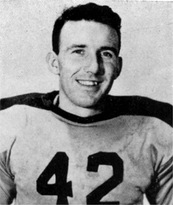 When Scott Henderson graduated from Dalhousie with his Bachelor of Law degree in 1953, an oft-used quote accompanied his picture and short bio reading “Actions speak louder than words.” No statement could be more appropriate for describing Scott, a dedicated multi-sport athlete at Dalhousie who let his play speak for him. A Tiger who played alongside some other big names, and just prior to many more, Scott Henderson helped to set the standard of excellence expected of those who would don the Black and Gold.
When Scott Henderson graduated from Dalhousie with his Bachelor of Law degree in 1953, an oft-used quote accompanied his picture and short bio reading “Actions speak louder than words.” No statement could be more appropriate for describing Scott, a dedicated multi-sport athlete at Dalhousie who let his play speak for him. A Tiger who played alongside some other big names, and just prior to many more, Scott Henderson helped to set the standard of excellence expected of those who would don the Black and Gold.
From 1948 to 1952 Scott was a starting player for the men’s varsity basketball team and in 1951-52 he was co-captain of the team. Described as a “spectacular guard,” Scott always found ways to contribute to the team success. This includes leading the Tigers back from 17 points down to win 55-54 in the final minute over Acadia to capture a Halifax and District senior basketball title. In 1950 he was part of the Halifax All-Star team that took on powerful St. Francis Xavier University. Later in his basketball career, he would lead the way for Dalhousie against another nationally dominant team from St.FX. In February of 1952 Scott scored 17 points to lead the Tigers over the X-Men and end their much heralded winning streak at 24 games. Scott could be counted upon to play steady, and always found something extra to give in important games. It was also while on a basketball trip, bumping a teammate out of the seat next to her, that Scott met his wife to be Jans Wilson, a star Dalhousie athlete in her own right.
The gridiron of Canadian football provided another venue for Scott to create more memorable moments. A stalwart backfield point scorer who, like most from his day, played both offense and defense, Scott was a key performer for the football Tigers from 1946 to 1953. Known for his dangerous speed, the team often relied on him for point production. One can imagine his play when reading descriptions of a game versus the Wanderers in 1950 that appeared in the papers as “Most exciting play of the game was a twisting, dodging, driving run by Scott Henderson from Dalhousie’s 50-yard line to the Wanderers goal zone. He went over with Murray Malloy wrapped around his ankles, both sliding across the goal line.” Another description describes the action as “…twisted out of the grasp of Don Burlton, reeled past the Wanders secondary and outraced Peatros and Malloy to the goal line.” Player of the Game honours went to Scott that day, despite a one-point Dalhousie loss.
Since Canadian football was a relatively new sport, there were many ups and downs during Scott’s time at Dalhousie. The Tigers developed a reputation as a dangerous offensive team who paired that with solid defending which lead to many exciting games, regardless of the outcome. A highlight of the team’s success came in 1951 when the Tigers captured the Purdy Cup, which at that time was awarded to the champion of the Halifax City Canadian Football League.
The 1952 football season produced much excitement not only for Dalhousie, but Halifax as well. The league was closely contested from start to finish and included an exhibition game versus Royal Military College from Ontario played in front of over 2,300 paying fans. In October Scott played an outstanding game against Cornwallis his efforts producing three interceptions and four touchtowns! It was in this season that Scott received recognition for his football skills as he was awarded the inaugural Mike Milovick Memorial Trophy as the leagues’ highest scorer. In the 1952 season Scott scored 11 touchdowns in 8 games for a total of 55 points. As described in the local newspaper, “This would seem to indicate that the sturdy young man with the springy legs is the league’s best ball carrier. You could say that. Others may run a bit faster. Some may be more spectacular. But for consistent ball-carrying, you’d have to rate Henderson at the top of the list.”
Despite often keeping the fans on the edge of their seats, Scott was never an outspoken or flashy athlete; he let his performances speak for him. As a Dalhousian, Scott was awarded the Climo Award for Dalhousie’s Top Male Athlete for the 1949-50 season, and received a Gold “D” in 1952 for three years of outstanding contribution to Dalhousie Athletics.
Following in the footsteps of his parents, the late Dr. and Mrs. R. Smith Henderson, who in 1951 were honoured with a special “fan support” award after attending just about every Dalhousie sporting event that year, Scott was a avid fan after his competitive days were over. A loyal member of the Dalhousie Black and Gold Club, he rarely missed games at Dalhousie, or to watch his children and grandchildren play at their respective schools. In fact could often be found shooting hoops with his grandchildren while he was in his seventies.
It is a privilege to honour Scott Henderson’s contributions to sport at Dalhousie with induction into the Dalhousie University Sports Hall of Fame.
Karin Maessen, Athlete: Volleyball
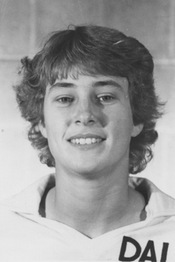 Karin Maessen began her Dalhousie career in the 1976-77 season. A Halifax native from Queen Elizabeth High, Karin was a multi-talented athlete who excelled in many sports. In her first year, Karin led the Dalhousie Tigers women’s volleyball team to the AUAA championship title, defeating perennial champions, University of New Brunswick. Karin was named team MVP in volleyball and in track and field. She won the Class of 55 Trophy as Dalhousie University’s outstanding female athlete; the only first year athlete to ever do this!
Karin Maessen began her Dalhousie career in the 1976-77 season. A Halifax native from Queen Elizabeth High, Karin was a multi-talented athlete who excelled in many sports. In her first year, Karin led the Dalhousie Tigers women’s volleyball team to the AUAA championship title, defeating perennial champions, University of New Brunswick. Karin was named team MVP in volleyball and in track and field. She won the Class of 55 Trophy as Dalhousie University’s outstanding female athlete; the only first year athlete to ever do this!
Karin competed for Dalhousie women’s volleyball for four more years – 1979-82, and 1983-84 and for Dalhousie track and field for two more years 1979-81. She won the Class of ’55 Trophy in 1981 and 1982. She was chosen team MVP in women’s volleyball in 1977, 1980, 1981, and 1982. Her leadership abilities were shown as she was appointed co-captain in 1979-82 and 1983-84. When asked about Karin, her teammates had said of her, “Super teammate to everyone…Sparkplug of the team, providing leadership, exceptional ability, and determination to help bring the team to its AUAA and CIAU victories…A consistent, dedicated player. She came through for us in every game…Everyone looked up to her as the team leader…She provides help whenever it is needed”. In 1994 former women’s volleyball head coach Lois MacGregor had this to say of her former player, “She was a coach’s dream athlete as she gave 150% every time she stepped on the court – in practices and in games- a delight to coach, and a wonderful, caring compassionate person to know.”
Karin Maessen’s teams won many tournaments, and she was recognized with All-Star and MVP awards at university competitions in Calgary, Manitoba, York, Waterloo, Laval, Sherbrooke, Moncton, Fredericton, and also at the Dalhousie Volleyball Classic. She garnered AUAA women’s volleyball All-Star awards in 1977, 1980, 1981, 1982 and 1984; AUAA league MVP in 1981 and 1982; and AUAA tournament MVP in 1980 and 1982.
Recognition also came Karin’s way from the CIAU as her opponents feared her as a player knowing that #12 would get that dig up no matter what and, if they happened to put a ball in her vicinity at the net, she would smash it down at them! For her outstanding play, she was chosen as a CIAU First Team All-Canadian in 1980, 1981 and 1982; as the CIAU Outstanding Player of the Year in 1982; as the CIAU national tournament MVP in 1982 when she led her team to the CIAU gold medal; and as a CIAU Tournament All-Star in 1980 and in 1984, leading team to a CIAU silver medal finish in 1984. “Karin’s athletic prowess will never be forgotten within the volleyball community,” said June Lumsden and Dave Jones of Volleyball Nova Scotia in 1994.
Karin’s Dalhousie track and field awards and accomplishments include in 1976-77 and 1980-81, three individual gold medals, two individual silver medals and relay team bronze (1980) and silver (1976); and CIAU medley relay bronze medal 1981. Her abilities and accomplishments as a Dalhousie athlete in both sports led former Athletic Director, Tony Martin, to say, in 1994, “Karin Maessen is arguably the finest athlete in the history of women’s sport at Dalhousie University and perhaps the Province of Nova Scotia.”
Outside of Dalhousie, Karin was a nine-year member of Canada’s National Women’s Volleyball Team and competed in three world championships; two Pan American Games, two World University Games and many tours in Central America, South America, North America, Europe, and Asia. She was a semi-pro player/coach for Nimes Perrier senior club team in France. She was named Female Senior Player of the Year by Basketball Nova Scotia in 1980 and a tournament All-Star at the Senior Nationals in 1981. She was the Sport Nova Scotia Female Athlete of the Year in 1981 and 1982, and in 1994 Karin was the first volleyball player inducted to the Nova Scotia Sport Hall of Fame. She received the Dalhousie A.J. “Sandy” Young Award for contribution to Nova Scotia Sport in 1997. Karin Maessen also made her mark as a coach at Saint Mary’s University and University of Victoria; assistant coach at Dalhousie in 1985-86; head coach of the Nova Scotia Canada Games women’s team; and many Dalhousie Superskills Camps from 1976-1986.
Karin Maessen always gave her all. She was an unbelievable role model for young athletes, an inspiration to her teammates, coaches, and her competitors, and she was the favourite of fans around the world who were amazed by her spark and determination on the court. Dr. A.J. “Sandy” Young, Jr., the noted sport historian and Dalhousie professor, said it best in 1994, “In my opinion, Karin Maessen is the best Nova Scotian all-round athlete in the modern era.”
Susan Mason MacLeod, Athlete: Swimming
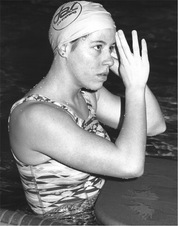 "Wow, what an opportunity it was," reflected Susan Mason, when interviewed by Halifax Herald sports writer Hugh Townsend in May 1982, at the conclusion of her swimming career. Her performances in the water from 1978-80 were unprecedented in the annals of Dalhousie’s athletic achievement. In September 1978, already a very accomplished athlete, Susan elected to attend Dalhousie University spurning scholarship opportunities to the south and joined the Tigers to swim in the eight lane 50 metre pool at Dalplex. "I never had any regrets about my decision, it was the best move that I've ever made." Her husband, former Dalhousie swimmer Donnie MacLeod is sure to agree! Both of her two older brothers and sister preceded her as members of the Tigers swim teams.
"Wow, what an opportunity it was," reflected Susan Mason, when interviewed by Halifax Herald sports writer Hugh Townsend in May 1982, at the conclusion of her swimming career. Her performances in the water from 1978-80 were unprecedented in the annals of Dalhousie’s athletic achievement. In September 1978, already a very accomplished athlete, Susan elected to attend Dalhousie University spurning scholarship opportunities to the south and joined the Tigers to swim in the eight lane 50 metre pool at Dalplex. "I never had any regrets about my decision, it was the best move that I've ever made." Her husband, former Dalhousie swimmer Donnie MacLeod is sure to agree! Both of her two older brothers and sister preceded her as members of the Tigers swim teams.
In her inaugural Atlantic Universities Athletic Association (AUAA) championship meet in 1979 she claimed three individual and two relay titles (the maximum number of events in which she was permitted to compete). Susan's first ever AUAA title came in convincing style when she won the 800m freestyle finishing in under nine minutes and over a minute ahead of her nearest competitor. In her four years of AUAA championship appearances Susan won every race she entered, collecting twelve individual and eight relay titles. During her years of AUAA competition she remained undefeated in freestyle event competition. Susan was named AUAA Female Swimmer of the Year and quite deservedly earned Tigers Most Valuable Swimmer honours, each season from 1979-1982.
At the 1979 Canadian Interuniversity Athletic Union (CIAU) championship this Tiger swimmer garnered three individual gold medals; winning the 200, 400 and 800 metre freestyle events and set two new CIAU records to earn recognition as the CIAU Female Swimmer of the Year. Over her varsity career Susan won a total of 17 CIAU championship medals. This four-time All-Canadian was an individual gold medalist on seven occasions and also won three silver and seven bronze medals, six of which were won as a member of a Dalhousie freestyle or medley relay team. Although the Dalhousie women's swimming team achieved its best-ever team standing of second place at the 1980 CIAU championship, it was not until 1981 that the team won its first-ever AUAA team title. Susan ended her illustrious varsity career contributing to a decisive second successive conference title for Dalhousie.
In 1977, for winning three individual golds, a silver and a bronze, Susan became the first Nova Scotian to ever win swimming medals at the Canada Summer Games. Her aquatic abilities earned her a place on Canada's national team in 1977 and in 1978 Susan competed in France, the Netherlands, Great Britain and the United States. At the 1978 Commonwealth Games in Edmonton, Susan placed fifth in her specialty 400 metre freestyle. "I think it was my scariest race," recalled Mason, "walking down the length of the pool with all those thousands of people looking on…..when they announced "Canada" my knees just went weak. But the nervousness was gone as soon as I got in the water. Once in the water you just block out all the pressure and just concentrate on the event." Three weeks later Susan finished tenth in the same event at the world championships in West Berlin, Germany.
In 1985 Susan became the youngest athlete to be inducted into the Nova Scotia Sport Hall of Fame. After retiring from competition, she coached the Nova Scotia Dolphins swim club for the physically challenged, for 10 years and was a national coach for the Stoke Manderville Games in Great Britain, the precursor of the Paralympic Games. As a founding organizer of the Canadian Championships for the Physically Challenged in 1991, she received the Rick Hansen Award from the Nova Scotia Recreation Council on Disability. In 1992, she coached Haligonian, and Dalhousie graduate, Nora Bednarski to a bronze medal in the Barcelona Paralympic Games. In 1993, Susan was a member of Nova Scotia's mission staff at the Kamloops, BC Canada Summer Games and in 1997, Susan was presented with the Dalhousie University men's and women's swim teams' Distinguished Swimming Alumnus Award.
It is a privilege to honour Susan (Mason) MacLeod as part of the inaugural induction to the Dalhousie University Sport Hall of Fame.
Ted Wickwire, Athlete: Football & Basketball
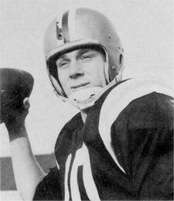 If the field and court could talk…oh, the stories they would tell.
If the field and court could talk…oh, the stories they would tell.
They would talk of the football and basketball legend, Ted Wickwire.
Frederick B. “Ted” Wickwire began his university career at Dalhousie in 1956. That autumn, Ted suited up for his first football game as a starting cornerback. During that game the quarterback suffered a serious injury. The result was bittersweet as rookie Ted assumed the quarterback position and did not relinquish his post through six seasons of varsity football.
During his rookie year (1956-57), the football Tigers did not win a game. Yet, the stands were full of cheering fans out to catch a glimpse of the perseverance and determination of the young team. Ted’s individual efforts were recognized by the Nova Scotia Canadian Football League as he was runner-up for Most Valuable Rookie honours.
It wasn’t until October 5, 1957 when the team’s hard work paid off. Dalhousie recorded a 39-6 victory over the Greenwood Bombers, breaking a 10-game, two-year losing streak. Ted and company never looked back. Ted was the passing and running star, alongside friend and fellow inductee, runningback great, Peter Corkum. The team became a force to be reckoned with and finished second to eventual league champs, the Shearwater Flyers.
The following year (1958-59), Ted, scored one touchdown and passed for another in a game against Stadacona. That effort propelled the team into the league semifinals. Dalhousie finished the season after being edged into a semifinal loss again at the hands of the Shearwater Flyers. The two-game total point series was a heartbreaking 28-20 deficit for the Tigers.
The team continued to improve into the 1959-60 season, the senior year of Ted’s undergraduate program. Again, Dalhousie faced Stadacona, this time in the league semifinal. The Tigers were victorious and advanced to the league’s championship game. Unfortunately, they fell victim to StFX, a team that would be the eventual national champions; a first for the Atlantic conference.
Ted’s exceptional play and leadership during the 1959-60 season resulted in the conference’s highest honour. He was awarded the Duffus Trophy as the Atlantic Football Conference (AFC)’s most valuable player. Also, Ted was runner-up for this award the following year.
Ted’s final season (1961-62) saw Dalhousie continue to be a leading force in the AFC. In the final game of his career, he went 15-31 for 142 yards and ran four times for 56 yards. Despite a third place league finish, Dalhousie’s superstar Ted was outstanding.
Ted’s university football career included rushing for 1100 yards and leading the conference by passing for over 4000 yards. He scored 42 points in league competition. Twice, Ted won the Little Trophy awarded to Dalhousie’s most valuable football player (1960-61, 1961-62). He also took home the Climo Award (1959-60), the highest athletic award that can be bestowed on a male Dalhousie student. The award is presented annually to the male who best displays outstanding athletic ability, sportsmanship and team spirit. Ted is remembered as one of the greatest quarterbacks to ever play in Maritime football.
The University honoured Ted and Peter, the living legends, at a ceremony following their last game of varsity football at Dalhousie. It was officially declared that November 11, 1961 was “Corkum and Wickwire Day,” marking the end of an era of football at Dalhousie.
On the court, Ted wore the black and gold for four varsity basketball seasons. In his rookie year (1956-57), Ted scored 28 points against Acadia only to out-do his own record the following year (1957-58) by scoring an unprecedented 42 points in a single playoff match against Saint Mary’s, putting Dalhousie in the conference championship final. He managed to accomplish these individual feats while being recognized as a superb team player, always willing to pass the ball.
Ted had a quiet modesty over his individual achievements. He was more eager to talk about Dalhousie’s 1959 basketball upset of StFX. The 56-55 score broke a five-year losing streak against the X-Men.
Other Dalhousie awards bestowed on Ted include a Silver “D” award for his rookie efforts in football and basketball in 1956-57 followed by a Gold “D” in 1958-59. Ted was also honoured with a First Engraving “D” in 1960-61. The monogrammed placards were presented for years of outstanding contribution to Dalhousie athletics.
Ted graduated from Dalhousie in 1959 with a Bachelor of Commerce degree. He was later admitted to the bar after receiving a Bachelor of Law degree in 1962.
Ted has served his community and his alma mater well. He was involved with numerous athletic organizations and councils at Dalhousie including three years as Chairman of the Advisory Council on Athletics and 13 years on the University’s Board of Governors. He also volunteered his time and shared his expertise with many professional associations related to his profession. In 1978, Ted was appointed the prestigious honour of Queen’s Council. In 1990, Ted was elected president of the Barrister’s Society and, in 1991, he was presented the Weldon Law Award for unselfish public service.
In 1993, by unanimous vote, the University’s Board of Governors renamed Studley Field, Wickwire Memorial Field, as it is known today. A commemorative plaque dedicated to Ted greets players, coaches and visitors upon entry to Wickwire Field.
Ted is remembered as an outstanding team player not only in sport but within his community. He set a great example of integrity, determination and spirit. It is an honour to recognize Ted’s exemplary contribution to athletics at Dalhousie by inducting him with the inaugural class of the Dalhousie University Sport Hall of Fame.
Nigel Kemp, Builder, Swimming
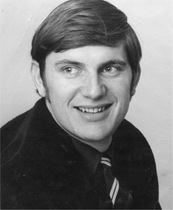 Making a difference. It is the goal of many aspiring coaches. The degree to which a coach makes a difference is measured by the success of the coach’s athletes. One can find no better example of someone who has made a difference than Dalhousie’s Nigel Kemp. His success through 27 years as a swimming coach at Dalhousie is exemplary.
Making a difference. It is the goal of many aspiring coaches. The degree to which a coach makes a difference is measured by the success of the coach’s athletes. One can find no better example of someone who has made a difference than Dalhousie’s Nigel Kemp. His success through 27 years as a swimming coach at Dalhousie is exemplary.
A former international swimmer for Great Britain, Nigel arrived at Dalhousie in 1971 to take a post as lecturer in what was then the School of Physical Education. He also became Head Coach of the Dalhousie swim teams. Nigel brought with him a coaching philosophy that has been the foundation of his long-term successes, “Success is improving, not necessarily winning.” One only has to look at the accomplishments of his swimmers, the international responsibilities and the recognition that Nigel has received during his time at Dalhousie to realize that this focus on improving has also resulted in a great deal of winning.
Under Nigel’s guidance the Dalhousie swim teams captured 27 AUAA championships. In conference dual meets the men’s and women’s teams amassed 263 victories for a winning percentage of 73.2 percent over this period. This team success is a reflection of Nigel’s dedication to all of the athletes, not just the superstars. In the departmental year-end reviews, mention was always made of those swimmers who achieved personal best times that year, a true measure of success. In recognition of his exemplary coaching, Nigel was selected ten times as the AUAA Coach of the Year and three times awarded Dalhousie’s Coach of the Year. The Dalhousie A.J. “Sandy” Young Award for contribution to sport in Nova Scotia, is special award with great prestige and meaning, especially for those recipients who are members of the Dalhousie family. Nigel was presented this award in 1998, and was fortunate to have been presented the award by Dr. A.J. “Sandy” Young himself.
During his tenure at Dalhousie, Nigel’s swimmers captured 63 CIAU medals, including 19 gold. The 1980 women’s swim team came closest to winning the national championship by finishing second, and close again in 1981, with a third-place finish. On this national stage, Nigel was recognized as the CIAU Coach of the Year in both 1974 and 1980. In 1975, Nigel was selected as the Canadian Swimming Coaches Association Coach of the Year.
Nigel was appointed to the Canadian Coaching Staff at the 1976 Olympics in Montreal, where he coached Dalhousian Nancy Garapick to two bronze medals. He was also named to the 1980 Olympic staff. He coached at the 1975 and ’78 World Championships and the 1978 Commonwealth Games. He also was appointed head women’s coach of Canada’s teams at the 1979 and 1983 FISU World University Games. At the 1979 games in Mexico City Nigel coached Dalhousian, Susan Mason (McLeod), to a bronze medal.
Recognizing the importance of development, Nigel also coached the Halifax Trojans Aquatic Club from 1971-80. His development of young swimmers was recognized as he coached the 1975 Canadian age group team at a meet in East Germany, and the Canadian youth team in Sweden in April 1973.
Nigel was inducted as a builder in the Nova Scotia Sport Hall of Fame in 1989. Two of Nigel’s swimmers preceded him as inductees; Susan Mason (McLeod) in 1985 and Nancy Garapick in 1986. Another one of his swimmers Andrew Cole was also inducted in 1993.
In a 1989 interview, Nigel expressed, “I’m trying to be the catalyst to help individuals meet the goals they set for themselves.” Nigel has been much more than that. He has been the catalyst for hundreds of swimmers and has made a profound and exemplary contribution to sport at Dalhousie. As an associate professor he continues to teach in what is now the School of Health and Human Performance, where appropriately his courses focus on coaching development. In November 2003, Nigel received the Canadian Swimming Coaches Association Coaching Contribution Award for his longstanding service in the field of coach education in Canada.
Nigel Kemp exemplifies the very best of Dalhousie athletics and it is a privilege to honour his contributions as an inaugural inductee into the Dalhousie University Sport Hall of Fame.
Lois MacGregor, Builder: Volleyball
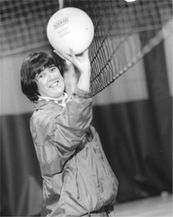 Lois MacGregor exemplifies what is best about sport. Her philosophy is to give every athlete the chance to improve by developing a strong team where everyone is involved. This philosophy has obviously paid off as can be seen through the many successes of her teams.
Lois MacGregor exemplifies what is best about sport. Her philosophy is to give every athlete the chance to improve by developing a strong team where everyone is involved. This philosophy has obviously paid off as can be seen through the many successes of her teams.
After playing for the Tigers for four years (1966-70), Lois took over as head coach in 1975 for a ten year span. During that time, her teams won five conference championships and a CIAU silver medal in1984. The highlight of her coaching career came in 1982 when she led Dalhousie to a gold medal at the CIAU national championship. Her volleyball team is still the only one from Atlantic Canada to ever accomplish this feat. As well, she has been honoured as Atlantic University Conference Coach of the Year four times and was twice named Dalhousie’s Coach of the Year.
Thanks in large part to her leadership, many of her players won significant conference and national awards and several went on to compete for Canada’s national team.
Lois is one of the co-founders of the Dalhousie Volleyball Classic, one of Canada’s most competitive and best-organized national level university tournaments. Additionally, she co-founded the Dalhousie High School Volleyball Tournament, an event which has grown into one of Canada’s largest high school competitions.
But her success is not limited to building strong teams. Her former players agree that she is also excellent in building strong people. She endeavoured to help mold women who would go on to be fine members of the community. Lois states, “I always tried to help my athletes be the best they could be individually and as a team while still having fun. I hoped my athletes would feel good about themselves from their participation on my teams and that they would continue to enjoy their sport and perhaps get involved in coaching other young people like themselves when they graduated from Dal.” As one of her former players, Joan Matheson says, “Although she was a tough taskmaster, Lois always went the extra mile to make our experience a positive one and during all of that, she never lost her sense of fun.”
When we speak about her contribution to volleyball at Dalhousie, we are really only scratching the surface when it comes to the full scope of influence Lois has had in volleyball in Nova Scotia and even across the country. Her tireless volunteer work with groups such as Volleyball Nova Scotia as a coach educator, clinician, and administrator have been invaluable to the development of the sport, particularly at the grass roots level. After retiring from her post at Dalhousie, her coaching continued at the junior and high school level. As an educator, Lois has shared her love of the sport with countless teachers, university students and professionals. She has long been an advocate of introducing volleyball to elementary school students with modified equipment and skills.
A few highlights of her many honours and awards include being inducted into the Nova Scotia Sport Hall of Fame in 1998 in the builder category and in 2002 as coach of the 1982 CIAU championship team. She was also the recipient of the coveted Dalhousie A.J. “Sandy” Young Memorial Award in 2003. This prize honours individuals who have contributed significantly to sport in Nova Scotia.
Lois is a faculty member in the School of Health and Human Performance and each year, has been selected as a mentor professor for the annual Academic All-Canadian luncheon. Many of her students rave about her enthusiasm and commitment to their development.
We are very proud to have Lois as one of the inaugural inductees to the Dalhousie University Sport Hall of Fame.
1976 Women's Field Hockey Team
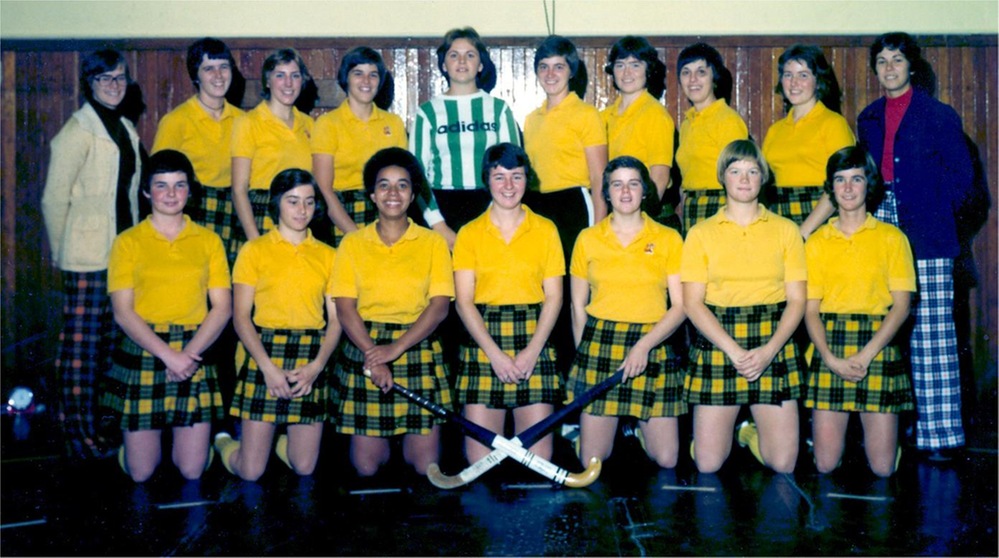 In the autumn of 1976 the Dalhousie varsity field hockey team made Dalhousie sport history by becoming Canadian Women’s Intercollegiate Athletic Union (CWIAU) champions. In sleet, snow, sun and fog, this Tigers team completed an undefeated regular season in the Atlantic University Athletic Union (AUAA) before moving on to the national championships hosted by Dalhousie. Determined and highly skilled athletes on the field, and good friends off, the squad spent many hours training, traveling and competing together that special fall, a time that led to the ultimate goal of a national championship.
In the autumn of 1976 the Dalhousie varsity field hockey team made Dalhousie sport history by becoming Canadian Women’s Intercollegiate Athletic Union (CWIAU) champions. In sleet, snow, sun and fog, this Tigers team completed an undefeated regular season in the Atlantic University Athletic Union (AUAA) before moving on to the national championships hosted by Dalhousie. Determined and highly skilled athletes on the field, and good friends off, the squad spent many hours training, traveling and competing together that special fall, a time that led to the ultimate goal of a national championship.
The season opened with high expectations as Dalhousie had won the AUAA title the year before and had only lost once at the inaugural CWIAU field hockey championship to the eventual winner, University of Toronto. The Tigers dominated Memorial University of Newfoundland 6-0 to start the season and followed this with a 3-0 win over Mount Allison University. It was not until the third game of the season that the Tigers surrendered a rare goal against to University of Prince Edward Island, but one was not enough as the Tigers went on to defeat the Panthers 3-1.
After a successful start at home Dalhousie took to the road and continued to look strong, posting convincing 3-0 and 5-0 wins over Acadia University and St. Francis Xavier University respectively, sandwiched around another home victory over StFX. The Tigers faced tough competition in New Brunswick where they defeated Université de Moncton 1-0 before cruising to a 3-1 victory over UNB. The Tigers finished the regular season with three more victories, two of which came via scores of 5-0, one each over Saint Mary’s University and Acadia. Undefeated heading into the AUAA championship at UNB, Dalhousie would face off against Moncton in the semifinal, coming out on top, and met host UNB in the final. The final was a dramatic match that saw the Tigers down 2-0 at the half. Refusing to be denied, the team fought back and tied the score 2-2, before capturing the conference title with a 3-2 victory on a goal by Erin O’Brien in the final minute of play.
The 1976 CWIAU championship was held during the first weekend in November at the Halifax Common. The Friday games saw the Tigers defeat University of Victoria 3-1 in their first game followed by a 5-1 victory over McGill University. The tournament encountered some wet Nova Scotia weather on Saturday and play was suspended for the day. The tournament resumed on Sunday with the pitch muddy and wet. These difficult conditions resulted in 0-0 draws for Dalhousie against Toronto and the University of Manitoba. The results of the round robin had the Tigers matched against the 1975 champions, the University of Toronto Varsity Blues, in the winner take all final, which was now slated for Monday morning due to the suspension of play on the weekend.
On a bright and cold Monday morning the Tigers took on the Varsity Blues in a game that proved fast paced and challenging. The Blues controlled much of the play for the first 40 minutes, but despite this edge in play, the Tiger defense was outstanding, allowing very few shots on goal.
The two teams continued to play hard and Dalhousie was awarded a penalty shot at 6:47 of the second half. Pam Dickey made no mistake and the Tigers were ahead 1-0. Toronto pressed hard throughout the remainder of the game, coming close to tying the score on a couple of occasions. Tiger goalie Merle Richardson proved unbeatable, as she had on so many occasions throughout the season, and the Tigers defended their lead. When the final whistle was blown the Tigers had accomplished what they had set out to do at the beginning, they were the 1976 CWIAU National Champions!
It is a privilege to honour the Dalhousie Tigers 1976 CWIAU Championship Field Hockey team with induction into the Dalhousie University Sport Hall of Fame.
Team members: Diane Boulanger, Shelley Deakin, Pam Dickey, Karen Kelly, Wendy MacMullin, Donna Misner, Andrea Mann, Erin O’Brien, Maeve O’Mahoney, Merle Richardson, Kim Robson, Brenda Sacre, Heather Shute, Jocelyn Webb, Julie West, Manager Barb Graves and head coach Nancy Buzzell.
1954 Men's Football Team
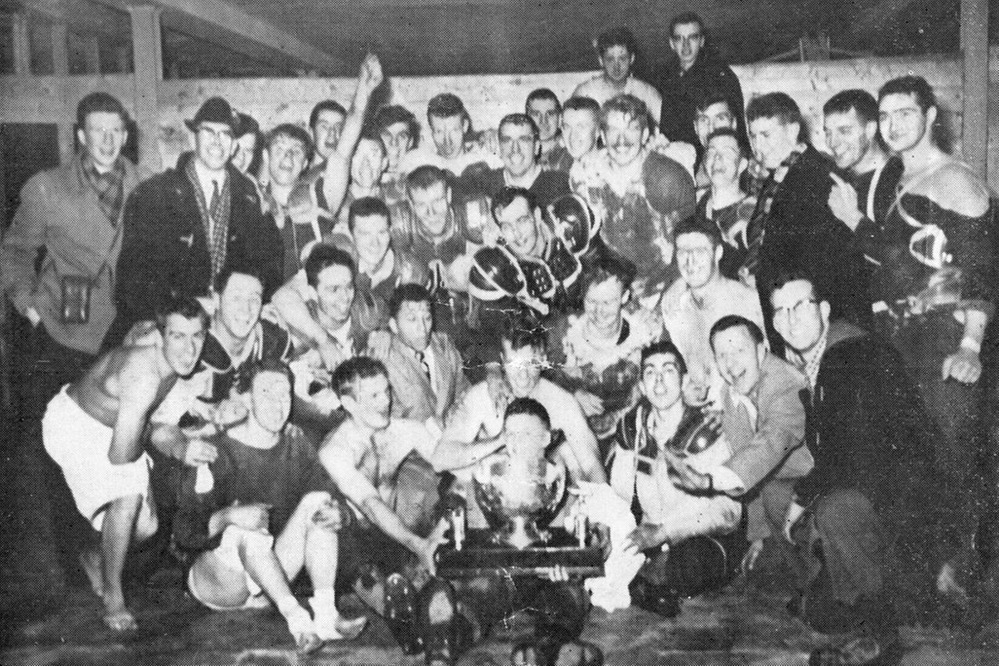 The 1954 Dalhousie football team had an outstanding season. Let’s salute the team as we examine their route to the Purdy Cup championship.
The 1954 Dalhousie football team had an outstanding season. Let’s salute the team as we examine their route to the Purdy Cup championship.
In the October 2 season opener on Studley Field before 2,026 fans, Stadacona defeated the Tigers 24-7. End Bob Goss hauled in a 15 yard pass from Reg Cluney for Dalhousie’s major, converted by Cluney. Under rookie head coach Al Thomas, Dalhousie was granted a late start to the season due to the fact that Dalhousie classes commenced in early October.
One week later, the Bengals came snarling from their den to blank the undefeated Shearwater Flyers 22-0 in Dartmouth on October 9 in what local fans termed the biggest upset in years. Coach Thomas introduced a two platoon system, a first for Dalhousie football. The defensive line headed by Bayne Henderson, Dick Eager, Pat Porter, Ted Marshall, Pete Adams and Hector McInnes was instrumental in keeping Shearwater off the scoreboard. Quarterback Reg Cluney (also good on two converts), Dave Bryson and Dave Theakston all ran for touchdowns while Bob Goss hauled in a 27 yard touchdown pass from freshman quarterback Stu McInnes. Touchdowns at the time were worth 5 points.
Premier Henry Hicks, who later became President at Dalhousie, put his foot behind the ceremonial kickoff on October 11 at a muddy and cold Greenwood Apple Bowl in front of 1,000 fans. Dave Bryson (convert by Cluney) and John Nichols ran for majors enroute to a 11-1 Tiger victory.
Next up for the improving Tigers was a chance to revenge their earlier loss to Stadacona, this time at the Wanderers Grounds. October 16 provided no different result with Stadacona prevailing 18-6. Despite the loss, the defensive squad played well with Hector McInnes and Peter Adams at ends, Pat Porter and Bayne Henderson at tackles with Mal Young and Walter Fitzgerald at the guard positions, Dick Eager, John Bourinot and George Slipp at suited up at the linebacker positions, with Bob Findlay and Don Murphy handling the back positions.
A new era in intercollegiate football commenced on October 23 when Dalhousie hosted a St. Francis Xavier team that was making its first appearance in the Nova Scotia Canadian Football League. The X-Men, improving with every game, played the Tigers to a 17-17 draw in a game attended by a crowd estimated at over 3,000. Garry Watson scored two touchdowns, one via a 35 yard pass from Cluney and Garry also converted a 20 yard interception. Dave Bryson, at running back, had the other touchdown while Chuck MacKenzie added two converts.
In their first ever Canadian Football encounter in Antigonish on October 30, the Tigers were dominated in almost every department by a pumped up St. Francis Xavier squad. In a muddy field, in the rain, the X-Men tamed the Tigers 38-6. Bryson caught a Stu McInnes pass for Dalhousie’s only touchdown, converted by Neil “Scorchy” McVicar. Don Lyons and Don Murphy had stellar games for the black and gold.
A previously hot and cold Dalhousie squad piled up the highest score of the season when they hosted the Greenwood Bombers on November 6 on the friendly confines of Studley Field. McVicar paced the Tigers with two touchdown’s (one run, one pass) and seven converts. Running backs Nip Theakston and John Nichols each earned touchdowns while Bryson added three of his own. Quarterback Reg Cluney went 9 for 16 in the air, good for 169 yards, with 4 touchdown strikes: two to Watson, a 52 yarder to Bob Goss and another to McVicar. Defensively, Dalhousie was led by the solid defensive play of Peter Adams, Charlie Lee, Dick Eager and Roger Greer and the Tigers finished the day with a solid 57-5 win over Greenwood.
Another home game and another impressive 19-0 win was next on the plate for the Tigers, this time on November 13 in their regular season finale against the Shearwater Flyers, while they played in near freezing conditions. Bryson ran for 180 yards including one touchdown, while John Nichols tallied an impressive 103 yards and another Tiger touchdown. A Cluney to Bob Goss aerial accounted for the other Dalhousie touchdown. Watson scored a rouge on a Goss kick with McVicar chipping in three converts.
The November 20 league semi final saw the Tigers continue their mastery over Shearwater. The big difference in the game was the line play of the Tigers. The offensive line of Garry Watson, Roger Greer, Gord Rankin, Don Lyons, Tom Kennedy, Larry Marshall and Bob Goss consistently opened huge holes for the Dalhousie running backs. Quarterback Reg Cluney ran for 2 touchdown’s, with Bryson, Nichols and McVicar running for a touchdown apiece. Bryson, Greer and Larry Marshall smothered a Goss kick in the end zone for one single while McVicar also had 4 converts to lead Dalhousie to a convincing 30-15 win over Shearwater.
The stage was set for the first all collegiate Purdy Cup, emblematic of Nova Scotia Canadian Football supremacy. The game was played in a mud and sawdust covered Memorial Field in Antigonish on November 27 before 1,800 fans. Several busloads of Dalhousie supporters made the trip and witnessed he underdog Tigers outplay the X-Men enroute to a 10-0 shutout. Two way captain Reg Cluney scored one touchdown and connected on a pass to Goss for the other major. Led by Bayne Henderson, Peter Adams, Mal Young, Ted Marshall, Brian Conrod, Pat Porter and George Slipp, the defensive line had another outstanding game. The secondary of Roger Greer, Dick Eager and Garry Watson were also most effective as were the tertiary of Stu McInnes and Don Murphy. The offensive line cited in the previous game were very tough and Flying Wings Lick MacDonald and Don MacLeod blocked and ran well all afternoon. Nip Theakston also played a key role at the flanker position and fullback Bob Findlay had a solid game.
Winning the Purdy Cup with an outstanding performance capped a great year for the ’54 Football Tigers, one of two great Dalhousie teams being inducted as part of the inaugural class for the Dalhousie University Sport Hall of Fame.
